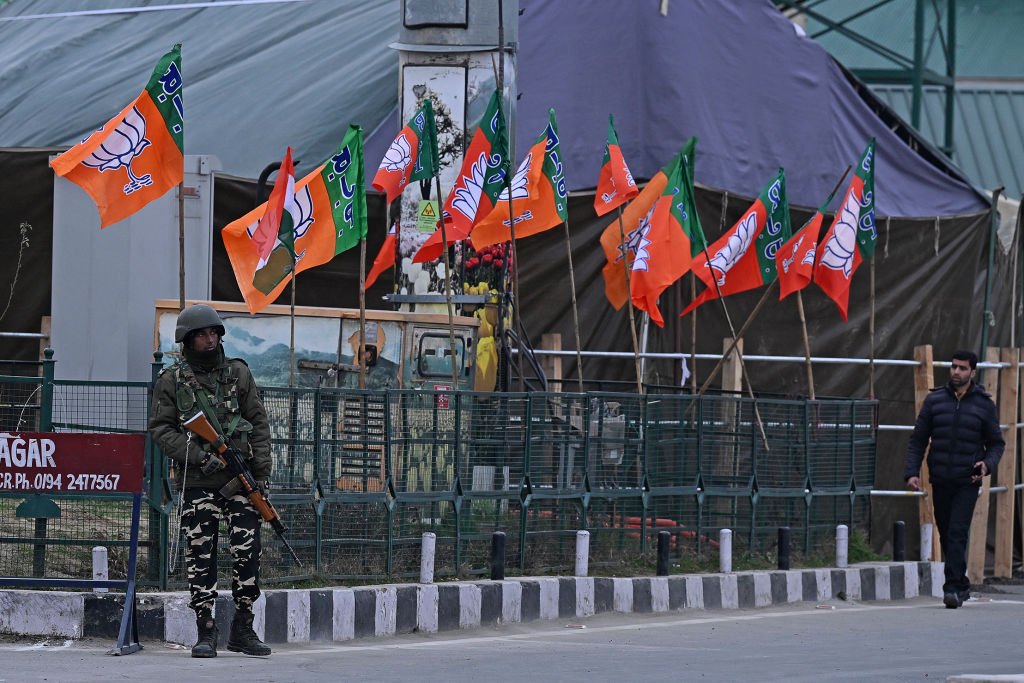- Tuesday, April 15, 2025
Local players such as NC and PDP are dominating the elections in three constituencies located in the Muslim-majority regions that the Hindu nationalist party has skipped.

By: indiaweekly.biz Staff
INDIAN prime minister Narendra Modi is busy travelling the length and breadth of the country for the ongoing national elections along with several ministers of his Bharatiya Janata Party (BJP) but for the first time since 1996, the Hindu nationalist party is not contesting the election in Kashmir, which ceased to remain a state and became a Union Territory (UT) after the Modi government abrogated Article 370 of the Indian Constitution that had given it a special status.
The three main parliamentary constituencies in the Muslim-majority region have seen the contest limited to local players instead — the National Conference (NC) and the People’s Democratic Party (PDP). While locking horns with each other, they have also said that they are opposed to the BJP and will align with the opposition alliance featuring the Indian National Congress.
Kashmir has a total of five seats in the Lok Sabha or popularly elected Lower House of the Indian parliament and three among them — Anantnag-Rajouri (voted on May 7), Srinagar (will vote on May 13) and Baramulla (will vote on May 20) are in the Muslim-dominated Kashmir.
Read: Indian Americans not okay with ‘Kashmir flag’ demand on US university campus
The BJP has fielded candidates in the two remaining seats — Udhampur and Jammu — in the Hindu-dominated Jammu division which voted in the first two phases.
Political analysts and the opposition parties are of the opinion that the BJP is skipping the election in Kashmir anticipating an unfavourable outcome despite Modi’s claim of a peaceful and integrated Kashmir since the removal of Article 370 which had brought the former state under New Delhi’s direct rule, triggering protest among the local parties and also in neighbouring Pakistan.
Both Modi and his party’s top leaders, including home minister Amit Shah, have expressed confidence time and again that the abrogation of Article 370 would restore normalcy in the state which has seen decades of violence and bring investments and jobs. Shah has claimed that the youth are now carrying laptops instead of stones to attack local security officers.
Read: Days before polls, 1 Indian air soldier killed, 4 injured in Kashmir terror attack
Under the move in 2019, Jammu and Kashmir state was split into two federally ruled areas – Kashmir valley and Jammu plains, and the mountainous, Buddhist-dominated Ladakh.
The local opposition leaders have not stopped taunting the BJP over its lack of candidates in Kashmir.
Omar Abdullah, a leader of the NC and a former chief minister of Jammu and Kashmir, asked why India’s ruling party was absent from the election.
“Clearly there is a gap between what the BJP claims to have done and the reality on the ground,” he was quoted as saying by Reuters at his residence in Srinagar, Kashmir’s main city.
However, the BJP said the decision was part of a broader strategy. Ravinder Raina, chief of the party’s Kashmir chapter, said they decided to give the election a miss due to some other strategy but did not divulge specifics.
“The BJP will not fight, but support a candidate who will work for peace, happiness, brotherhood and democracy,” in each of the three seats, he said.
The Hindu nationalist party, which has made alliances in other parts of the country where it has not been a strong player traditionally like in the southern states, did not announce which of the many small parties in the fray it will support.
The BJP had contested in all the three seats in Kashmir and lost them to the NC. It had won both the seats in Jammu.
Mehbooba Mufti, chief of the PDP who has been a chief minister of Jammu and Kashmir with the support of the BJP in the past, is contesting from the Anantnag-Rajouri constituency which according to many, could have been the best bet for Modi’s party to enter Kashmir in the ongoing election.
Two years ago, a commission appointed by the Modi government had changed the borders of the constituencies in Kashmir as well as Jammu. In Anantnag, which had more than 1.6 million largely Muslim votes in 2019, around a million mostly Hindu voters were added from Poonch and Rajouri districts of Jammu.
Mufti told Reuters that the Modi government was altering the balance of voters and attempting to disempower, divest and dispossess Muslims, especially the Kashmiris.
The redrawing was done to give the BJP an advantage but still the party didn’t field a candidate in the 2024 elections which shows how things must be for it, Abdullah, who is contesting from Baramulla, said, according to Reuters.
Raina, however, is of the opinion that the redrawing has made the constituencies more representative of the region.
According to a report by India Today, Raina had expected the BJP to field a candidate from Anantnag-Rajouri constituency but it was not to be.
Reuters reported that interviews with several residents, political leaders, security officials and analysts in both Kashmir and New Delhi suggest that discontent continues in the heavily militarized Himalayan zone despite the claims made by the top leadership.
While Kashmir has suffered under decades-long insurgency, the conflict between India and Pakistan both of which claim it fully has not helped things either. The nuclear-powered neighbours have fought more than one war over Kashmir since their independence in 1947.
While India has accused Pakistan of fueling insurgency in Kashmir, the latter has said that it gives moral support to the local people.